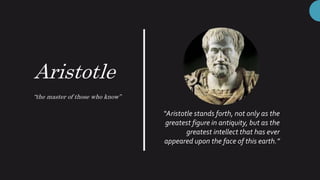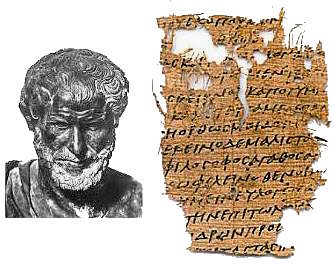Reference




OpenAI's Answer
Aristotle, one of the most influential ancient Greek philosophers, made numerous significant contributions to various fields of knowledge. Below are some of his key contributions:
-
Logic and Philosophy:
- Categorical Syllogism: Aristotle invented the logic of the categorical syllogism, laying the groundwork for formal logic.
- Theory of Causation: He introduced the concept of the four causes (material, formal, efficient, and final causes), which are foundational in understanding the nature of change and existence.
- Metaphysics: In his work "Metaphysics," Aristotle explored existence and reality, delving into the topics of substance, potentiality, and actuality.
-
Natural Sciences:
- Classification of Living Beings: Aristotle is considered the founder of zoology for his detailed classification of living organisms which heavily influenced biological sciences.
- Physics and Cosmology: He offered substantial insights into the physical world, although often speculative, contributing to fields like natural philosophy and cosmology.
- Biology: His observational studies in marine biology and comparative anatomy are particularly noteworthy.
-
Ethics and Political Science:
- Nicomachean Ethics: Aristotle's work on ethics emphasized the concept of virtue ethics, focusing on achieving eudaimonia (flourishing or happiness) through virtuous living.
- Political Theory: In "Politics," Aristotle detailed his theories regarding the state and citizenship, providing a framework for Western political philosophy.
-
Psychology and Rhetoric:
- De Anima (On the Soul): This work discusses psychology, particularly the nature of the soul and its functions.
- Rhetoric: Aristotle’s "Rhetoric" revolutionized the art of persuasion, outlining strategies that are still studied and implemented today.
Aristotle's impact on Western thought and numerous academic disciplines is immense, making his works foundational texts in many fields of study.
For more detailed insights into his contributions, you can refer to the following sources:
- Internet Encyclopedia of Philosophy - Aristotle
- Britannica - Aristotle's Contributions
- Ancient History Lists - Top 10 Contributions of Aristotle
- Stanford Encyclopedia of Philosophy - Aristotle
- NCBI - Aristotle
Images:
Aristotle's comprehensive and systematic works continue to influence and guide modern scientific, philosophical, and ethical thought.
Follow Up
Related
How did Aristotle's reception of Heraclitus influence philosophical thought?
What aspects of ethics are covered in Aristotle's Nicomachean Ethics?
What are some criticisms Aristotle had regarding Heraclitus's philosophical ideas?
What arguments are made regarding Heraclitus and the principle of contradiction in Aristotle?
